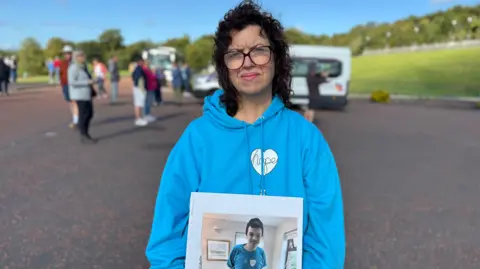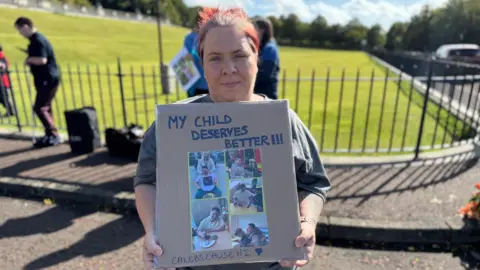Rebekah WilsonBBC News NI
 BBC
BBCA parent whose son has special educational needs said she “feels like a prisoner” in her home due to an inability to find him a place in daycare.
Suzy Ward was among about 50 people, including parents and children, who protested outside Stormont on Monday morning over what they say is a lack of support and services.
The protest coincides with the return of assembly members to Stormont following the summer recess.
Education Minister Paul Givan said he had plans to establish a “flagship” capital programme for the special educational needs (SEN) school estate.
Suzy Ward told BBC News NI her son Eoyn was now at home full time, which meant she did not “get a break” and was “constantly on the go”.
“I really feel that we need opportunities and respite and support,” Ms Ward said.
“It’s so difficult. There’s days where we are both at home and I feel like a prisoner.”
Education Minister Paul Givan said he recognised the “real challenges” within the sector, and a plan had been “mapped out”.
“I will need other parties to support me,” he said.
“I met the finance minister just last week, I outlined to him the ask we’re going to require. It’s £1.7bn over the next 10 years.”

Sheena McCann, who was at the protest, said her son Joe is 17 and they were in the process of transitioning him into adult care services.
“In our case we are getting two days in the day centre for a few hours and that’s not going to work – he needs the same place to go to for consecutive days. It’s very difficult to get him out of the house,” she said.
“It’s really left to me and my husband, and it’s really hard to know we can’t leave the house.
“Ten years ago you would have got five days and transport, everyone is being failed here. I can’t believe in this day and age this has been allowed to happen.”

Tina Henderson, who was at the protest for her son Robin, said she was a single mum and received “no support whatsoever”.
“I’m here today because I’m fed up,” she said.
“I got four hours respite all summer, I dread the future of being just stuck in the house.”
She said it was “very hard” for her son to transition to other places and he needs to feel safe to go along with any changes.
Ms Henderson said politicians did not understand because “they aren’t in our world… if they knew they would see the struggles”.
What is available for children with SEN?
There are about 70,000 SEN students in Northern Ireland and 29,000 of them have an official statement outlining the support they need.
A pupil can receive a statement of SEN, which is a legal document setting out the support they should receive.
A statement – and the support it mandates – ends when a child leaves school, rather than being in place up to the age of 25.
In contrast, in England an education, health and care plan (EHCP) outlines a young person’s special educational needs up to the age of 25.
It is a legal document, which also describes the additional support they need in education or training and the outcomes they would like to achieve.
Though there has been criticism that some councils in England fail to meet deadlines set out in the plan.
In Wales and Scotland there have been recent reforms to help young people with SEN transition from school.
The Department for the Economy estimates that there has been a 134% rise in demand for such services in Northern Ireland over the past two decades.

